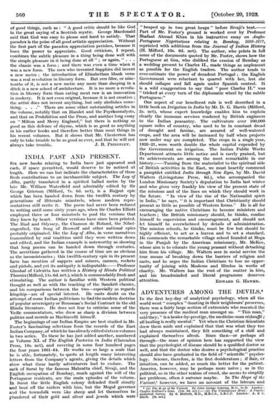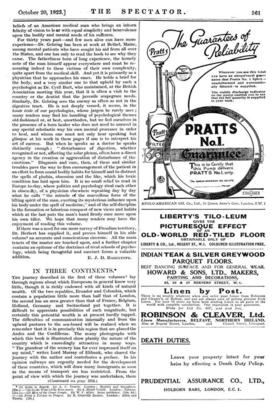ADVENTURES AMONG THE DEVILS.*
IN the first hey-day of analytical psychology, when all the world went " complex "-hunting in their neighbours' preserves, there was a fairly large section of extremists who resented the very presence of the medical man amongst us. " This man," said they, " is a healer-by-prestige, the medicine-man rIchauffe ; all healing is really mental." Yet when the Christian Scientists drew them aside and explained that that was what they too had always maintained, they felt something of a chill and explained themselves afresh. Since then—or perhaps all' through—the mass of opinion here has supported the view that the psychologist of disease should be a qualified doctor as well, and that the doctor who desires a psychological practice should also have graduated in the field of "scientific" psycho- logy. Science, therefore, is the first desideratum ; if flair, or intuition, can be added, so much the better for the patient. America, however, may be perhaps more naive ; as in the political, so in the other realms of creed, she seems to simplify her problems, often a outrance maybe. In The Hope of the Variant,' however, we have an account of the labours and • (1) The f :Lye of the Variant. By John George Gehring, Sc.D. London : Charles ScrIbner's Sons. [10s. 6d. neti----(2) The Unconscious Mind : A Tsychc- analytical Survey. By S. Herbert, M.D., M.R.C.S., L.E.C.P. London: A. at C. Mack. Lee. net.I
beliefs of an American medical man who brings an inborn felicity of vision to lx ar with equal simplicity and benevolence upon the bodily and mental needs of his sufferers.
For thirty years past—and few men alive can have more experience—Dr. Gehring has been at work at Bethel, Maine, among mental patients who have sought his aid from all over the States, and one has only to read the book to see why they came. The fatherliness born of long experience, the homely note of the man himself appear everywhere and must be re- assuring indeed to these victims of their own complexity, quite apart from the medical skill. And yet it is primarily as a physician that he approaches his cases. He holds a brief for the body, and a very similar one to that upheld by such a psychologist as Dr. Cyril Burt, who maintained, at the British Association meeting this year, that it is often a visit to the country or the dentist that the juvenile scapegrace needs. Similarly, Dr. Gehring sees the enemy as often as not in the digestive tract. He is not deeply versed, it seems, in the haute ecole of our psychologies, whose jargon he rarely uses ; many readers may find his handling of psychological themes old-fashioned or, at best, unorthodox, but we feel ourselves in the presence of a born healer who does not need to unravel in any special scholastic way his own mental processes in order to heal, and whom one must not only hear speaking but glimpse at his work in these pages if one is to interpret his art of success. But when he speaks as a doctor he speaks distinctly enough ; " disturbances of digestion, whether recognized or not, affecting the solarplexus, often have a direct agency in the creation or aggravation of disturbance of the emotions." Diagnosis and cure, then, of these and similar troubles pave the way to firm encouragement of the patient in an effort to form sound bodily habits for himself and to distrust the spells of phobia, obsession and the like, which his toxic condition has laid upon him. It is no small relief to read in Europe to-day, where politics and psychology rival each other in obscm sty, of a physician elsewhere repeating day by day what he calls " the miracle of the marvellous force of the lifting spirit of the man, exerting its mysterious influence upon his body under the spell of medicine," and of the self-discipline in the formation or laborious conquest of new views and habits which at the last puts the man's hand firmly once more upon his own tiller. We hope that many readers may have the enjoyment of reading this volume.
If there was a need for one more survey of Freudian territory, Dr. Herbert has supplied it, and proves himself in his able volume= an accurate and conscientious cicerone. All the main tenets of the master are touched upon, and a further chapter contains an epitome of the doctrines of rival schools of psycho- logy, which being thoughtful and succinct forms a valuable











































 Previous page
Previous page